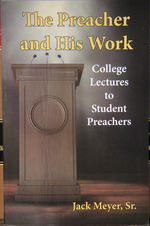
“In February of 1953, Brother Jack Meyer spent a week of intense work at Central Christian College, now known as Oklahoma Christian University. He delivered a number of lectures each day. Some of these were to the entire student body, but most of them were directed primarily toward those who were planning to become preachers, teachers, or wives of preachers and teachers. These lessons were intended to be practical and helpful in meeting the everyday problems that Christian workers inevitably encounter. Many of the suggestions grew out of actual experiences. Brother Meyer had all of his lessons well outlined and copied when he presented them – as he always did. All who heard them agreed that they should be published, so that others might benefit from them.”
The Preacher and His Work provides a wealth of wisdom and practical advise for all who would lead in the Lord’s kingdom. Though directed mainly towards preachers, the scope of the book should not be limited to that group of leaders.
The following is a list of topics covered in the books:
1- The place of the preacher in the congregation.
How the preacher is to function in conjunction with congregational leadership. All of the roles of leadership and their interlocking parts are covered.
2- The preacher’s family.
Expectations of the preacher’s family as well as areas of attention preachers need to pay to their families. He gives some much needed advice to children as well as to wives of leaders and preachers.
3- The preacher’s library.
Some suggestions on books to include in one’s library, how to fund a library, and the necessity of building a library.
4- Study and related matters.
A discussion of study habits, study techniques, topical selections, and study environment.
5- Recreation and related matters.
Wise suggestions about the types of recreation to engage and not engage in as well as thoughts on the regulation of recreation.
6- Special pitfalls.
“These are some particular dangers to the work of a preacher. Let me illustrate what I have in mind in this way: Make a list of all the preachers you know who have been forced to leave a given work; list the reasons for such leavings, as far as you can ascertain; look over your list, and most of them will be one of the seventeen “special pitfalls” that will be studied in these four speeches. These seventeen dangers are the ones which most often trip preachers.” (p. 52)
The material presented in the seventeen pitfalls are vitally important for every preacher and congregational leader to consider. The cost of the book is worth the material in this section alone.
7- The problem of visiting.
How to build personal relationships, develop new leads, introduce yourself to a congregation, and avoid problematic situations.
8- Developing the church in work (parts 1-3)
Suggestions for programs to engage membership in the work. Some of the material in this section is helpful while other parts are based on false methods such as bible classes, vacation bible school, and institutionalism.
9- Trends and critical battle grounds.
Four issues are dealt with: Modernism, Catholicism, Radical Extremism, and Worldliness. Under the heading of “Radical Extremism” Brother Meyer attacks those opposed to bible classes, institutionalism, and located preachers. The reader is urged to ignore Brother Meyer’s attacks on bible classes and institutionalism or to compare the with such works as Walking by Faith by Roy Cogdill (on institutionalism) or The Teaching by Jerry Cutter (on bible classes). If you do not have access to either of these work, please contact me at nathanbattey@gmail.com and I will provide the materials to you.
10- Opportunists and Discouragement.
Brother Meyers discusses the need for conviction in the word of God and ways to avoid discouragement. Every preacher and leader will at some point encounter discouragement as he is confronted with the evils of Satan. Erecting barricades to protect in times of discouragement are important and wise advise is given by one who has faced great difficulties.
Pros:
The Preacher and His Work provides a wealth of sound advise many leaders and preachers have never received. If leaders and preachers would take Brother Meyer’s words of wisdom to heart, many difficulties could be avoided and greater successes gained. Many preachers and leaders could attest to the wisdom of Brother Meyer’s advise and recount situations where they wished they had received his counsel in advance.
One of the refreshing characteristic of Brother Meyer’s work is his directness to the issue at hand; he does not “beat around the bush” but is to the point and clear on his positions. Brother Meyer’s outspokenness on worldliness, immorality, carnal warfare, and lack of bible study is refreshing. In short, The Preacher and His Work is full of “old time gospel preaching.”
Cons:
Brother Meyers is wrong on the bible class issue, and institutionalism which includes the support of orphanages, hospitals, missionary societies, and the Herald of Truth program. These issues come up several times throughout the book and should be noted. Again, if you would like material explaining the error of his positions please consult Walking by Faith by Roy Cogdill (on institutionalism) and The Teaching by Jerry Cutter (on bible classes). If you do not have access to either of these work, please contact me at nathanbattey@gmail.com and I will provide the materials to you.
Some areas could have been strengthened through the use of more Scripture, though this is more of a critique than a con.
Conclusion:
In the words of Ron Courter, “Books are all chicken and bones. You have to figure out which ones have the most meat and the fewest bones.” There is far more meat to this book than there are bones and the meat is of the sort that has been scarce in recent days. Our hope is that this book will find its way into the libraries of many preachers and leaders and serve to strengthen their work for the cause of Christ.
The Preacher and His Work has been out of print for several decades and has recently been reprinted in a limited quantity for distribution by Christian Researcher Publications. Quantities are limited, so pick up your copy today by clicking HERE.
| The Preacher and His Work by Jack Meyer Sr. - Reviewed by Nathan Battey.pdf |

 RSS Feed
RSS Feed
